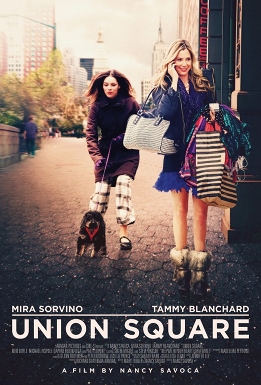The hysterical energy that opens up Nancy Savoca's Union Square is enough to redeem the
fact that it completely falls apart in a deeply unfortunate non-ending that
almost renders the whole film pointless.
For several minutes, when the film opens in media res on the image of Bronx stereotype Lucy (Mira Sorvino)
stepping out of the subway into Union Square. The film plays out like a
Dardenne-like character study of an incredibly unlikely character. After being turned down by an apparent
ex-fling and having a volatile, public tantrum, Lucy shows up at the apartment
of estranged "reformed" sister Jenny (Tammy Blanchard) and makes herself at
home.
Lucy and Jenny's dynamic is most interesting when there's an
air of mystery surrounding the histories of both. The proceedings remain involving thanks to a healthy smattering
of sequences that expand the nature of Lucy's initially grating behavior as
well as the decision to shoot the film, which largely takes place in a single
room, with agile handheld camerawork.
As the film's plot unfolds, it is revealed that the mysterious past
haunting the duo is disappointingly simplistic, and the film needlessly
complicates itself by throwing in a few last-act twists without much
explanation. Though the
sentimentality that Union Square
makes a clumsy attempt at in its final moments is earned, the circumstances and
the awkward use of Facebook as a device threaten to derail what was a perfectly
decent little film about the distance between families. Fortunately, there's plenty during the
running time to keep it just that.

